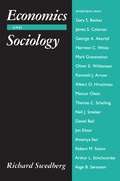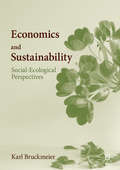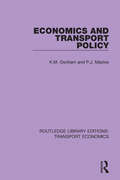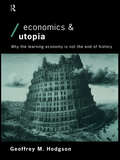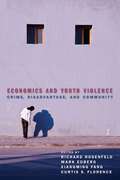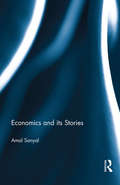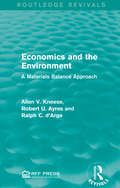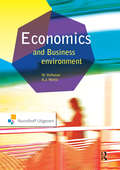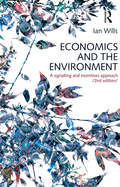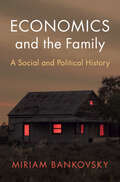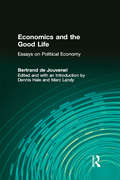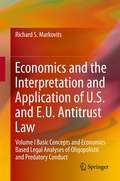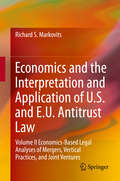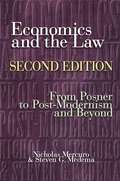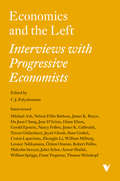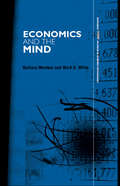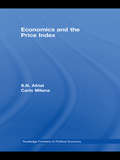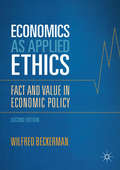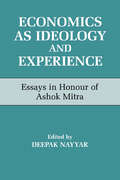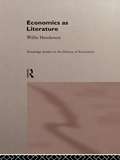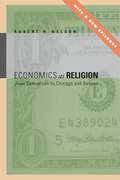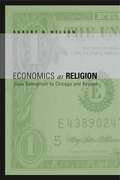- Table View
- List View
Economics and Sociology: Redefining Their Boundaries: Conversations with Economists and Sociologists
by Richard SwedbergThe boundary between economics and sociology is presently being redefined--but how, why, and by whom? Richard Swedberg answers these questions in this thought-provoking book of conversations with well-known economists and sociologists. Among the economists interviewed are Gary Becker, Amartya Sen, Kenneth Arrow, and Albert O. Hirschman; the sociologists include Daniel Bell, Harrison White, James Coleman, and Mark Granovetter. The picture that emerges is that economists and sociologists have paid little attention to each other during most of the twentieth century: social problems have been analyzed as if they had no economic dimension and economic problems as if they had no social dimension. Today, however, there is a dialogue between the two fields, as economists take on social topics and as sociologists become interested in rational choice and "new economic sociology." The interviewees describe how they came to challenge the present separation between economics and sociology, what they think of the various proposals to integrate the fields, and how they envision the future. The author summarizes the results of the conversations in the final chapter. The individual interviews also serve as superb introductions to the work of these scholars.
Economics and Sustainability: Social-Ecological Perspectives
by Karl BruckmeierThis textbook provides an overview of economic perspectives on sustainability. It synthesises economic, ecological and interdisciplinary sustainability research and by applying an integrated social-ecological and economic framework, demonstrates how this research can be improved and implemented in practice. Split into three parts, the book begins by introducing a range of topics forming the basis of knowledge needed to understand the varying sustainability discourses in economics, ecology and interdisciplinary sustainability research. Chapters cover the political context of sustainability; the history of sustainability in European environmental discourses dating back to the seventeenth century; as well as various problems and forms of interdisciplinary knowledge integration and synthesis in the sustainability process. Part II reviews the core economic themes relevant to sustainable development including natural resource management, environmental economics and ecological economics. Also highlighted are often neglected issues such as conflicts, disasters and interrelated crises on the way towards sustainability. The chapters in Part III discuss the future of the sustainability process. They argue for the necessity of overhauling the relationship between science and practice; explore failures and the unforeseen difficulties of sustainability transformation; and discuss how to enable a long term sustainability process that reaches into the distant future.An innovative resource for a broad range of interdisciplinary programmes on sustainability. The book will be an invaluable reference for master and PhD students, instructors, researchers and practitioners in sustainability governance.
Economics and Transport Policy (Routledge Library Editions: Transport Economics #7)
by K.M. Gwilliam P.J. MackieThis book, first published in 1975, discusses the development of transport policy in the UK against a background of economic theory. It comprises a comprehensive review of transport policy both in urban and inter-urban situations from an economic standpoint. It provides the tools for analysis of policy changes in the transport sector.
Economics and Utopia: Why the Learning Economy is Not the End of History (Economics as Social Theory)
by Geoffrey M HodgsonSince the fall of the Berlin Wall we have been told that no alternative to Western capitalism is possible or desirable. This book challenges this view with two arguments. First, the above premise ignores the enormous variety within capitalism itself. Second, there are enormous forces of transformation within contemporary capitalisms, associated with moves towards a more knowledge-intensive economy. These forces challenge the traditional bases of contract and employment, and could lead to a quite different socio-economic system. Without proposing a static blueprint, this book explores this possible scenario.
Economics and Youth Violence: Crime, Disadvantage, and Community
by Richard Rosenfeld Curtis S. Florence Mark Edberg Xiangming FangHow do economic conditions such as poverty, unemployment, inflation, and economic growth impact youth violence? Economics and Youth Violence provides a much-needed new perspective on this crucial issue. Pinpointing the economic factors that are most important, the editors and contributors in this volume explore how different kinds of economic issues impact children, adolescents, and their families, schools, and communities.Offering new and important insights regarding the relationship between macroeconomic conditions and youth violence across a variety of times and places, chapters cover such issues as the effect of inflation on youth violence; new quantitative analysis of the connection between race, economic opportunity, and violence; and the cyclical nature of criminal backgrounds and economic disadvantage among families. Highlighting the complexities in the relationship between economic conditions, juvenile offenses, and the community and situational contexts in which their connections are forged, Economics and Youth Violence prompts important questions that will guide future research on the causes and prevention of youth violence.Contributors: Sarah Beth Barnett, Eric P. Baumer, Philippe Bourgois, Shawn Bushway, Philip J. Cook, Robert D. Crutchfield, Linda L. Dahlberg, Mark Edberg, Jeffrey Fagan, Xiangming Fang, Curtis S. Florence, Ekaterina Gorislavsky, Nancy G. Guerra, Karen Heimer, Janet L. Lauritsen, Jennifer L. Matjasko, James A. Mercy, Matthew Phillips, Richard Rosenfeld, Tim Wadsworth, Valerie West, Kevin T. Wolff
Economics and consumer behavior
by Angus Deaton John MuellbauerThe idea of duality has proved to be a powerful device in modern work on the economics of consumer behaviour. The authors have used duality to provide an integrated and accessible treatment of this subject. The book focuses on applications of the theory to welfare economics and econometric analysis. The book begins with four chapters that provide a self-contained presentation of the basic theory and its use in applied econometrics. These chapters also include elementary extensions of the theory to labour supply, durable goods, the consumption function, and rationing. The rest of the book is divided into three parts. In the first of these the authors discuss restrictions on choice and aggregation problems. The next part consists of chapters on consumer index numbers; household characteristics, demand, and household welfare comparisons; and social welfare and inequality. The last part extends the coverage of consumer behaviour to include the quality of goods and household production theory, labour supply and human capital theory, the consumption function and intertemporal choice, the demand for durable goods, and choice under uncertainty.
Economics and its Stories
by Amal SanyalThe book explains the basic ideas of economics along with their historical context. It includes the events and traditions of the era of mentors—Smith, Ricardo, Marx, Walras, Keynes—with the economics they developed and controversies around them.
Economics and the Environment: A Materials Balance Approach (Routledge Revivals)
by Robert U. Ayres Allen V. Kneese Ralph C. d'ArgeThis monograph length report, first published in 1970, originated from a program of research at Resources for the Future that dealt with the management of residuals and of environmental quality. It presents some of the broad concepts that the program was based on and represents the effort to break out of the traditional approach in pollution and policy research, which had treated air, water, and solid waste problems as separate categories. This book will be of interest to students of economics and environmental studies.
Economics and the Business Environment
by A. J. Marijs W. HullemanEconomics and the Business Environment is directed at students who will be taking up managerial positions in trade and industry or in government. The economic environment of European companies is central to the book giving students a good impression of recent developments within the European economy. The theories described enable students to: calculate how much competition firms within a particular business sector are exposed to analyze the current economic position of a particular country and make exchange rate prognoses gauge the effect of the economic environment on business sales and profits. Complicated analyses and mathematical models have been avoided as much as possible. Instead, diagrams and graphs illustrate the causal relationships between economic factors, making this book an ideal primer for those needing the basics of economics for their business degree.
Economics and the Environment: A signalling and incentives approach
by Ian WillsCoordinating our use of the earth's natural resources is not easy. Resource users are many, their goals diverse, and their impacts on the environment often uncertain.How we use those resources depends on the signals and incentives we receive, from either the market or our governments. These systems encourage certain uses of natural resources, but they are not perfect. We harm the environment not out of malice, but because we do not know the consequences of our actions, or the incentives for harm are too great to ignore.Economics and the Environment argues that, by lowering the cost and improving the quality of the necessary signals and incentives, we can better reconcile our diverse interests in the environment. It introduces an economic way of thinking about environmental issues, without assuming a background in economics:* how the economy and the environment interact* how resource use is coordinated in ideal market and planned economies* the barriers to ideal signalling and incentives in real markets and real government planning* the economist's tools for dealing with natural resource issues* the uncertainty and complexity of environmental issues: climate change, water rights, air pollution and overharvesting of common resources.This second edition of Economics and the Environment is fully updated and includes new material on sustainability, valuation of environmental changes, the prospects for international cooperation under the Kyoto Protocol and the problems of defining and enforcing measures to protect biodiversity. It offers students in both economics and environmental studies programs a coherent framework for understanding our major environmental problems.'Ian Wills succeeds in providing a fresh perspective . . . a very interesting and informative textbook.'Economic Record
Economics and the Family: A Social and Political History (Historical Perspectives on Modern Economics)
by Miriam BankovskyMost economists think family economics began in the 1960s when price theory was applied to family behaviour. Instead, this book focuses on enduring concerns with family poverty across the last two centuries. In nineteenth-century Britain and Europe, economists debated the effects of poverty relief and sought to improve family productivity. In the US, interwar household consumer economists studied how to rationalise family consumption, because factories were producing goods for low-income families. From the 1960s onwards, 'New' household economists attributed family poverty to inadequate human capital investment in predominantly non-white families. Even when feminist, development, and queer economists problematised gendered injustices, they recentred family poverty, targeting the 'pauperisation' of motherhood and the marginalisation of 'families we choose.' Economics and the Family does not simply reconstruct this alternate history, it also shows how economists in all these periods overlooked injustices which must be shouldered today.
Economics and the Good Life: Essays On Political Economy
by Gary BeckerBertrand de Jouvenel (1903-1987) was known in the United States primarily as a political scientist. His best-known works--On Power, Sovereignty, and The Pure Theory of Politics--all made distinctive contributions to our understanding of the modern state, and to the creation of a political science capable of civilizing that state. His work in the field of economics is relatively unknown in the United States, but like many writers in the contemporary field of political economy, de Jouvenel is not interested in expanding the claims of economy at the expense of polity. On the contrary, his thinking is governed by the oldest and most fundamental of political concerns, the definition of the good life.The good life is not a product of the marketplace, but of deliberate and collective decision--that is, a task for thoughtful citizens and statesmen, and not simply the sum of millions of separate and amoral "consumer preferences." De Jouvenel is well known for his opposition to the distended state, but he was no anarchist. His eloquent warnings to keep the state in its proper sphere were accompanied by a richly sophisticated discussion of what the proper sphere is--an aspect of his work that comes through very clearly in this volume.Written between 1952 and 1980, the essays range from a discussion of technology to reflections on such fundamental economic concepts as "amenity" and "welfare." They include the deeply theoretical as well as the practical and the concrete. All are informed by de Jouvenel's insistence that a science which seeks to understand the production and distribution of "goods" must be concerned in the first place with the good itself. Economics and the Good Life is a companion volume to The Nature of Politics: Selected Essays of Bertrand de Jouvenel. Like the earlier volume, this collection is accompanied by an editor's introduction that places the essays in the wider context of de Jouvenel's work. This work is essential to the libraries of economists, political theorists, historians, and sociologists.
Economics and the Historian
by Peter H. Lindert Thomas G. Rawski Susan B. Carter Jon S. Cohen Stephen Cullenberg Donald N. Mccloskey Hugh Rockoff Richard SutchThese essays provide a thorough introduction to economics for historians. The authors, all eminent scholars, show how to use economic thinking, economic models, and economic methods to enrich historical research. They examine such vital issues as long-term trends, institutions, labor--including an engaging dialogue between a labor historian and a labor economist--international affairs, and money and banking. Scholars and teachers of history will welcome this volume as an introduction and guide to economics, a springboard for their own research, and a lively and provocative source of collateral reading for students at every level. The combined research experience of these authors encompasses many varieties of economics and covers a kaleidoscopic array of nations, subjects, and time periods. All are expert in presenting the insights and complexities of economics to nonspecialist audiences.
Economics and the Interpretation and Application of U.S. and E.U. Antitrust Law: Volume I
by Richard S. MarkovitsThis volume (1) defines the specific-anticompetitive-intent, lessening-competition, distorting-competition, and exploitative-abuse tests of illegality promulgated by U.S. and/or E.U. antitrust law, (2) compares the efficiency defenses promulgated by U.S. and E.U. antitrust law, (3) compares the conduct-coverage of the various U.S. and E.U. antitrust laws, (4) defines price competition and quality-or-variety-increasing-investment (QV-investment) competition and explains why they should be analyzed separately, (5) defines the components of individualized-pricing and across-the-board-pricing sellers’ price minus marginal cost gaps and analyses each’s determinants, (6) defines the determinants of the intensity of QV-investment competition and explains how they determine that intensity, (7) demonstrates that definitions of both classical and antitrust markets are inevitably arbitrary, not just at their periphery but comprehensively, (8) criticizes the various protocols for market definition recommended/used by scholars, the U.S. antitrust agencies, the European Commission, and U.S. and E.U. courts, (9) explains that a firm’s economic (market) power or dominance depends on its power over both price and QV investment and demonstrates that, even if markets could be defined non-arbitrarily, a firm’s economic power could not be predicted from its market share, (10) articulates a definition of “oligopolistic conduct” that some economists have implicitly used–conduct whose perpetrator-perceived ex ante profitability depended critically on the perpetrator’s belief that its rivals’ responses would be affected by their belief that it could react to their responses, distinguishes two types of such conduct–contrived and natural–by whether it entails anticompetitive threats and/or offers, explains why this distinction is critical under U.S. but not E.U. antitrust law, analyzes the profitability of each kind of oligopolistic conduct, examines these analyses’ implications for each’s antitrust legality, and criticizes related U.S. and E.U. case-law and doctrine and scholarly positions (e.g., on the evidence that establishes the illegal oligopolistic character of pricing), and (11) executes parallel analyses of predatory conduct--e.g., criticizes various arguments for the inevitable unprofitability of predatory pricing, the various tests that economists/U.S. courts advocate using/use to determine whether pricing is predatory, and two analyses by economists of the conditions under which QV investment and systems rivalry are predatory and examines the conditions under which production-process research, plant-modernization, and long-term full-requirements contracts are predatory.
Economics and the Interpretation and Application of U.S. and E.U. Antitrust Law: Volume II
by Richard S. MarkovitsVolume 2 uses the economic and legal concepts/theories of Volume 1 to (1) analyze the U.S. and E.U. antitrust legality of mergers, joint ventures, and the pricing-technique and contractual/sales-policy distributor-control surrogates for vertical integration and (2) assess related positions of scholars and U.S. and E.U. antitrust officials. Its analysis of horizontal mergers (1) delineates non-market-oriented protocols for determining whether they manifest specific anticompetitive intent, would lessen competition, or are rendered lawful by the efficiencies they would generate, (2) criticizes the U.S. courts’ traditional market-share/market-concentration protocol, the HHI-oriented protocols of the 1992 U.S. DOJ/FTC Guidelines and the European Commission (EC) Guidelines, and the various non-market-oriented protocols the DOJ/FTC have increasingly been using, (3) argues that, although the 2010 U.S. Guidelines and DOJ/FTC officials discuss market definition as if it matters, those Guidelines actually reject market-oriented approaches, and (4) reviews the relevant U.S. and E.U. case-law. Its analysis of conglomerate mergers (1) shows that they can perform the same legitimate and competition-increasing functions as horizontal mergers and can yield illegitimate profits and lessen competition by increasing contrived oligopolistic pricing and retaliation barriers to investment, (2) analyzes the determinants of all these effects, and (3) assesses limit-price theory, the toe-hold-merger doctrine, and U.S. and E.U. case-law. Its analysis of vertical conduct (1) examines the legitimate functions of each type of such conduct, (2) delineates the conditions under which each manifests specific anticompetitive intent and/or lessens competition, and (3) assesses related U.S. and E.U. case-law and DOJ/FTC and EC positions. Its analysis of joint ventures (1) explains that they violate U.S. law only when they manifest specific anticompetitive intent while they violate E.U. law either for this reason or because they lessen competition, (2) discusses the meaning of an “ancillary restraint” and demonstrates that whether a joint-venture agreement would be illegal if it imposed no restraints and whether any restraints imposed are ancillary can be determined only through case-by-case analysis, (3) explains why scholars and officials overestimate the economic efficiency of R&D joint ventures, and (4) discusses related U.S. and E.U. case-law and DOJ/FTC and EC positions. The study’s Conclusion (1) reviews how its analyses justify its innovative conceptual systems and (2) compares U.S. and E.U. antitrust law as written and as applied.
Economics and the Law: From Posner to Postmodernism and Beyond - Second Edition
by Steven G. Medema Nicholas MercuroThis is an expanded second edition of Nicholas Mercuro and Steven Medema's influential book Economics and the Law, whose publication in 1998 marked the most comprehensive overview of the various schools of thought in the burgeoning field of Law and Economics. Each of these competing yet complementary traditions has both redefined the study of law and exposed the key economic implications of the legal environment. The book remains true to the scope and aims of the first edition, but also takes account of the field's evolution. At the book's core is an expanded discussion of the Chicago school, Public Choice Theory, Institutional Law and Economics, and New Institutional Economics. A new chapter explores the Law and Economics literature on social norms, today an integral part of each of the schools of thought. The chapter on the New Haven and Modern Civic Republican approaches has likewise been expanded. These chapters are complemented by a discussion of the Austrian school of Law and Economics. Each chapter now includes an "At Work" section presenting applications of that particular school of thought. By providing readers with a concise, noncritical description of the broad contours of each school, this book illuminates the fundamental insights of a field with important implications not only for economics and the law, but also for political science, philosophy, public administration, and sociology.
Economics and the Left: Interviews with Progressive Economists
by C. J. PolychroniouTwenty-four economists discuss how they promote egalitarianism, democracy and ecological sanity through research, activism, and policy engagement Economics and the Left presents interviews with twenty-four leading progressive economists. All of these practitioners of the &“dismal science&” are dedicated to both interpreting the world and changing it for the better. The result is a combustible brew of ideas and reflections on major historical events, including the Covid-19 pandemic and its impact on the global economy. Interviewed are: Michael Ash, Nelson Henrique Barbosa Filho, James K. Boyce, Ha-Joon Chang, Jane D&’Arista, Diane Elson, Gerald Epstein, Nancy Folbre, James K. Galbraith, Teresa Ghilarducci, Jayati Ghosh, Ilene Grabel, Costas Lapavitsas, Zhongjin Li, William Milberg, Léonce Ndikumana, Ozlem Onaran, Robert Pollin, Malcolm Sawyer, Juliet Schor, Anwar Shaikh, William Spriggs, Fiona Tregenna and Thomas Weisskopf.
Economics and the Mind (Routledge INEM Advances in Economic Methodology)
by Mark D. White Barbara MonteroEconomics is often defined as the science of choice or human action. But choice and action are essentially mental phenomena, an aspect rarely mentioned in the economics discourse. Choice, while not always a conscious or rational process, is held to involve beliefs, desires, intentions and arguably even free will. Actions are often opposed to mere bodily movements, with the former being in some sense only understandable in reference to mental processes while the latter are understandable in entirely non-mental, physical terms. While philosophers have long concerned themselves with the connections between these concepts, economists have tended to steer clear of what might appear to be an a priori debate. At the same time, philosophers working on these important notions have tended to not dirty their hands with the empirical, real-world applications in which economists are specialized. This volume fills these gaps by bringing economists and philosophers of mind together to explore the intersection of their disciplines.
Economics and the Price Index (Routledge Frontiers Of Political Economy Ser. #Vol. 111)
by S.N. Afriat Carlo MilanaThe price index, a pervasive long established institution for economics, is a number issued by the Statistical Office that should tell anyone the ratio of costs of maintaining a given standard of living in two periods where prices differ. For a chain of three periods, the product of the ratios for successive pairs must coincide with the ratio for t
Economics and the Public Purpose
by John Kenneth GalbraithThe third and most important of Galbraith's major works brings completely into focus his model of our modern economic society.
Economics as Applied Ethics
by Wilfred BeckermanThe focus of this textbook is on the link between ethics and economic policy analysis. Basic philosophical concepts are systematically described, followed by conventional welfare economic theory and policy, and applications to some topical economic problems such as income distribution and sustainable development.
Economics as Ideology and Experience: Essays in Honour of Ashok Mitra
by Deepak NayyarThis collection of essays, collected and published in tribute to the economist Ashok Mitra is inevitably diverse, given the wide range of interests of his professional friends and colleagues. There is however one common thread that runs through the articles; a shared belief that ideology and experience, just as much as theory and policy, are inseparable in economics.
Economics as Literature (Routledge Studies in the History of Economics)
by William HendersonA rich vein of economics writings which runs through the nineteenth century and beyond is now largely ignored because its authors were women or because they favoured literary over scientific forms. Economics as Literature re-examines some of the most interesting texts from within this tradition.The works considered include:*stories (eg by Maria Edgeworth and Harriet Martineau)*dialogues (eg by Jane Marcet and Thomas de Quincey)*'imaginative' writing (eg from Ruskin and Francis Edgeworth)*Keynes' General Theory which is locked within a nineteenth century 'tradition' of uniting science and art.
Economics as Religion: From Samuelson to Chicago and Beyond
by Robert H. NelsonRobert Nelson’s Reaching for Heaven on Earth, Economics as Religion, and The New Holy Wars: Economic Religion Versus Environmental Religion in Contemporary America read almost like a trilogy, exploring and charting the boundaries of theology and economics from the Western foundations of ancient Greece through the traditions that Nelson identifies as “Protestant” and “Roman,” and on into modern economic forms such as Marxism and capitalism, as well as environmentalism. Nelson argues that economics can be a genuine form of religion and that it should inform our understanding of the religious developments of our times. This edition of Economics as Religion situates the influence of his work in the scholarly economic and theological conversations of today and reflects on the state of the economics profession and the potential implications for theology, economics, and other social sciences.
Economics as Religion: From Samuelson to Chicago and Beyond
by Robert H. NelsonIn this study, Robert H. Nelson explores the genesis, the prophets, the prophesies, and the tenets of what he sees as a religion of economics that has come into full blossom in latter-day America. Nelson does not see "theology" as a bad word, and his examination of the theology underlying Samuelsonian and Chicagoan economics is not a put-down. It is a way of seeing the rhetoric of fundamental belief—what has been called "vision."
